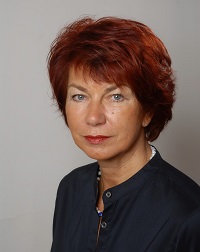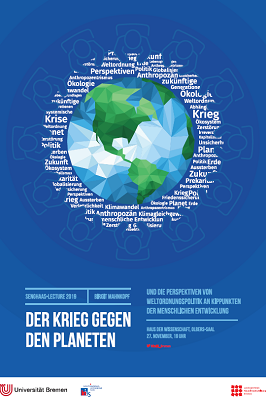Dieter-Senghaas-Lectures
With its annual lecture series on European and world political developments, crises and conflicts, the Institute for Intercultural and International Studies pays tribute to its Senior Fellow Prof. Dr. Dr. h.c. Dieter Senghaas, who is not only one of the founding fathers of the Institute, but also one of the most internationally renowned and renowned peace and conflict researchers. In 2015, the lecture series was opened by Prof. Klaus Dieter Wolf, Executive Member of the Board of the Hessian Foundation for Peace and Conflict Research, in the historic "Stadtwaage".
2021: Kriege beenden - aber wie? Verhandlungen, Dialog, Mediation und der afghanische Friedensprozess
2019: Prof. Dr. Birgit Mahnkopf: Der Krieg gegen den Planeten und die Perspektiven von Weltordnungspolitik an Kipppunkten der menschlichen Entwicklung
2018: Prof. Dr. Dr. h.c. Hans Joas: Postnationaler Imperialismus? Eine militaristische Denktradition und ihre gegenwärtige Bedeutung
2017: Prof. Dr. Dr. h.c. Gudrun Krämer: Einheit, Vielfalt. Differenz. Vom Umgang mit dem Anderen im zeitgenössischen Islam
 Prof. Dr. (retired) Birgit Mahnkopf
Prof. Dr. (retired) Birgit Mahnkopf Poster "Der Krieg gegen den Planeten"
Poster "Der Krieg gegen den Planeten"2019: Prof. Dr. Birgit Mahnkopf: Der Krieg gegen den Planeten und die Perspektiven von Weltordnungspolitik an Kipppunkten der menschlichen Entwicklung
The 5th Dieter-Senghaas-Lecture will take place on November 27, 2019 in the Olbers-Saal in the Haus der Wissenschaft (7 pm). Prof. Dr. Birgit Mahnkopf (retired) talks about the "war against the planet". The event is supported by the Landeszentrale für Politische Bildung Bremen. All citizens are cordially invited to the event.
You can download the poster here (as pdf or as png)
Depending on their geographical and social origins, people have become a "geological factor", albeit to varying degrees, which has upset the climate balance of the Earth system and thus destroyed the "web of life" that has developed over billions of years. With the inclusion of all regions of the world in the economic and ecological system of capitalism, humanity now seems to have arrived at the "planetary threshold" identified by climate researchers. Beyond this threshold, irreversible massive and sudden consequences must be expected for all living beings: A development path towards a "hothouse" state that could last for tens to hundreds of thousands of years.
Is it conceivable that a progressive human development is possible under the conditions of collapsing ecosystems and an essential lack of "treasures of nature" that are indispensable for us? How likely is it that civilization of unavoidable conflicts and contemporary tolerance will emerge? In short, can we imagine a "world order in the fragmented world" (Dieter Senghaas) that gives peace a future or do we not have to understand the global problems as elements of a systemic crisis of capitalism that cannot be solved within this system?
Birgit Mahnkopf is Professor (retired) of European Social Policy at the Berlin School of Economics and Law. She is a member of the scientific advisory board of attac Deutschland, the board of trustees of the Institut Solidarische Moderne, and the advisory board of the Open Access journal Momentum Quarterly. Her work focuses on the economic, political and social dimensions of globalization as well as on European and international politics. She also deals with sociology of work and industrial relations as well as with economics and politics of education.
With this lecture series, the Institute for Intercultural and International Studies (InIIS) and the Landeszentrale für Politische Bildung Bremen honour the life and work of the internationally renowned peace and conflict researcher, who has been teaching at the University of Bremen since 1978 and is a co-founder of InIIS. With the "civilizing hexagon", which emphasizes the possibilities of peaceful development in and between societies, he has created a paradigm that has made it into the Abitur tasks of German students and into the most important textbooks of international relations. His book "Zivilisierung wider Willen" ("Civilization Against Will") on the long and difficult process of sustainable peace-building in Europe has been translated into numerous languages, including Chinese, Arabic and Korean. His oeuvre includes 35 books written by him as well as 35 other books in which he was involved as editor or co-author.

